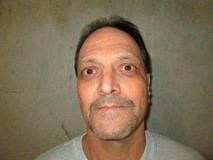McALESTER, Okla. (AP) — Oklahoma executed a man Thursday for the torture slaying of his girlfriend’s 3-year-old son in 1993.
Richard Stephen Fairchild, who turned 63 on Thursday, began receiving the first of a lethal three-drug combination at 10:10 a.m. at the Oklahoma State Penitentiary in McAlester. He was declared dead at 10:24 a.m.
Fairchild, an ex-Marine, was convicted of killing Adam Broomhall after the child wet the bed. Prosecutors say Fairchild held both sides of Adam’s body against a scorching furnace, then threw him into a table. The child never regained consciousness and died later that day.
Strapped to a gurney inside the death chamber, Fairchild thanked his attorneys and prison staff and apologized to Broomhall's family.
“Today's a day for Adam, justice for Adam," Fairchild said.
“I'm at peace with God. Don't grieve for me because I'm going home to meet my heavenly father."
Michael Hurst, the slain child's uncle, said the boy would have been 34.
“Our long journey for justice has finally arrived," Hurst said, adding that he was surprised to hear Fairchild express remorse for killing his nephew. “He hadn't said that in 30 years.”
Prosecutors from the Oklahoma attorney general's office had described the boy's killing as torture when they wrote to the state's Pardon and Parole Board, which voted 4-1 last month against recommending clemency for Fairchild.
Fairchild's execution was the seventh since Oklahoma resumed carrying out the death penalty in October 2021 and one of four scheduled nationwide over a two-day stretch. It was the 16th execution in the U.S. this year, including one in Texas and one in Arizona on Wednesday, up from last year’s three-decade low of 11. An execution was also scheduled for later Thursday in Alabama. Oklahoma's attorney general this summer asked the state's top criminal appeals court to set more than two dozen execution dates.
Attorneys for Fairchild argued that he was abused as a child, was mentally ill and was remorseful for his actions.
“As Richard Fairchild’s brain has deteriorated, he has descended into psychosis, a fact well-documented in his prison records,” Emma Rolls, one of Fairchild’s attorneys, said in a statement to the Pardon and Parole Board. “Yet despite having lost touch with reality, Richard remains remorseful for his crime and continues to have an unblemished prison record. There is no principled reason for Oklahoma to execute him.”
Fairchild’s attorneys filed last-minute appeals Wednesday with Oklahoma’s Court of Criminal Appeals and the U.S. Supreme Court, but both courts denied his requests Thursday morning.
Earlier Thursday, the Oklahoma Court of Criminal Appeals denied a request from death row inmate Richard Glossip for a hearing to determine whether a co-defendant sought to recant his testimony that Glossip hired him to kill motel owner Barry Van Treese.
Glossip's attorneys allege evidence was withheld by prosecutors, including interviews with witnesses. The court rejected a similar request by Glossip earlier this month and on Thursday ruled that the matters are not eligible for review because they either were settled previously by courts, could have been presented in earlier appeals or were not raised within 60 days of their discovery.
Glossip is scheduled for execution in February.
The U.S. has seen waning support in recent years for the death penalty across all political parties. About 6 in 10 Americans favor the death penalty, according to the General Social Survey, a major trends survey conducted by NORC at the University of Chicago. While a majority continue to express support for the death penalty, the share has declined steadily since the 1990s, when nearly three-quarters were in favor.
___
Associated Press reporter Ken Miller in Oklahoma City contributed to this report.
___
More of AP’s coverage of executions can be found at https://apnews.com/hub/executions
Sean Murphy, The Associated Press



